What does French Presidential election mean for Europe, Russia & world?

Due to the vagaries of the French system, the winner of the race for the Élysée Palace may find themselves reduced to the status of a political eunuch. That said, this weekend's election remains pivotal to the future of France, Europe, and the wider world.
Everybody’s entitled to a second chance. Even political pollsters. However, many are wondering when will tolerance finally run out for the sultans of electoral swing? Because, across the globe, the number crunchers have been getting things badly wrong in recent years.
If the soothsayers were correct, Prime Minister Ed Miliband could today call President Hillary Clinton to discuss London’s forthcoming Presidency of the EU. But they were miles off, and Theresa May and Donald Trump instead talked Brexit at their Washington summit in January. Incidentally, another ballot the pundits flunked.
This weekend, the polling companies have a shot at redemption. It’s round one of France’s race to find a successor to the, deeply unpopular, Francois Hollande. And surveys show how Emmanuel Macron and Marine Le Pen will progress to the final run-off. Safely over the initial hurdle, the young En Marche! frontman is projected to defeat his nationalist opponent in the deciding contest comfortably. Because published feedback paints Le Pen as toxic to much of the French center-ground.
Yet, recent experience in Britain and America suggests things mightn’t be as straightforward. And this means Francois Fillon, Benoit Hamon, and Jean-Luc Melenchon have no reason to give up dreaming yet. Especially the former who, despite scandal after scandal, hasn’t received the metaphorical stake through the heart that would finally kill his chances. Indeed, there are still a few observers who believe Fillon could yet win the Élysée.
Murderous horror
When terrorism gripped France last year, with the most notable attacks in Paris and Nice, Le Pen’s anti-migrant rhetoric helped her gather momentum. However, until Thursday’s murder of a Paris policeman, which has been claimed by ISIS, panic levels had dropped in 2017. Thus, the fall-out from the latest outrage may translate to extra support for the Front National leader. And if she emerges with a clear lead from the first count, the entire complexion could change.
For French voters, the chief issues are the moribund economy and a stubborn unemployment rate of around ten percent. The most radical plans to combat this come from Hamon and Macron. Growing hostility to the European Union is another major factor, which benefits Le Pen and Melenchon, who oppose Brussels to varying degrees. Meanwhile, the third major concern is security and immigration, which have become linked in France. Both Le Pen and Fillon are suggesting varying clampdowns in these areas.
Another factor is potential legislative gridlock. The French system is best described as a multi-party parallel to the American set-up. And, while US Presidents often have difficulty passing laws through Congress, it’s nothing compared to the possible congestion in Paris. Because, in an unprecedented situation, three of the five leading contenders (Le Pen, Macron, and Melanchon) lack the support of a prominent parliamentary grouping. Concurrently, in another corollary to Washington, Fillon’s Republicans are massively divided right now. As a result, the only player sure of support, at this minute, in the Senate and National Assembly is Hamon. But his Socialists are likely to be wiped out in the summer elections to those houses, rendering that advantage moot.
Wider stakes
Outsiders looking in will be more interested in the geopolitical implications. Especially when it comes to the future of Europe. Fillon, Hamon, and Macron are broadly pro-EU, with the last two generally happy about the status quo and identifying as Merkel-esque liberals. On the contrary, the older Fillon has presented himself as a traditional Catholic democrat, more in tune with conservative Christian Democrats.
But Melanchon and Le Pen see things very differently. The latter has threatened to withdraw from the euro, “the day after” her victory. Which is, of course, impossible in practice. And Melanchon also proposes taking a sledgehammer to Brussels. Even if neither succeeds, Eurocrats will be nervous of what awaits in 2022. Because the, once unthinkable, notion of France eventually leaving the EU is now openly discussed in mainstream discourse. This suggests that the clock is ticking unless the union radically transforms itself in the coming years.
When it comes to international relations, Hamon offers more of the same redundant Hollande positions. But Melanchon wants America out of European affairs. He’s suggested a security conference for the entire continent, centered around a review of post-Soviet borders, especially between Russia and Ukraine. The left-winger also suggests France construct an alliance with the BRICS, in preference to current Washington dominance. Le Pen is even more friendly to Moscow than her opponent. She insists Crimea is Russian territory and plans to recognize the de facto position of the peninsula immediately. Furthermore, sanctions would be a thing of the past, and she envisages a broad European alliance against Islamic fundamentalism, to include Russia as a “key ally.”
For his part, Fillon also wants Moscow back in the European fold. He’s spoken of the stupidity of forcing Russia into China’s arms. Additionally, he agrees with Melanchon on the need for a new legal arrangement on security, by-passing the obsolete NATO club, and echoes Le Pen’s desire for the removal of trade penalties and an anti-ISIS partnership. Macron, the pollster’s choice, is sending similar warm overtures to the Kremlin. But he wants military issues discussed within existing NATO structures. When it comes to bilaterals, he seeks the “normalization” of relations and the eventual “de-escalation” of sanctions. However, he doesn’t appear to envisage a role for the Russians inside ‘Europe.’
Whatever the outcome, the fragmentation of the French system is the big story. After decades where two blocs, the Republicans, and Socialists, more-or-less dominated politics in Paris, we are almost guaranteed to see the influence of both diluted. This is analogous to events in Italy, Ireland, Spain and the Netherlands, where the established mainstream has been reeling in recent years. And it means old certainties will have to consign to history.
Also, with the Socialists on the verge of implosion, the Republicans enduring a seemingly irremediable split and Le Pen, Macron, and Melanchon having no parliamentary support base, there’s a big chance of France becoming essentially ungovernable. And that’s in nobody’s interests. For this reason, Fillon could yet defy the odds and sneak through the first round. After all, the French electorate has always shown a willingness to forgive scandal and human weakness in the past. As Valéry Giscard d’Estaing, Jacques Chirac and Francois Mitterrand have proven.
The statements, views and opinions expressed in this column are solely those of the author and do not necessarily represent those of RT.

















